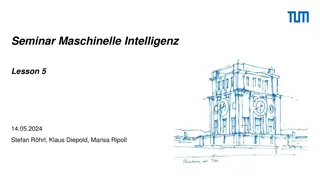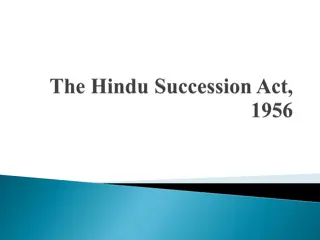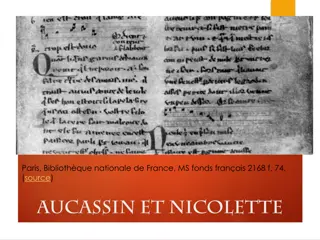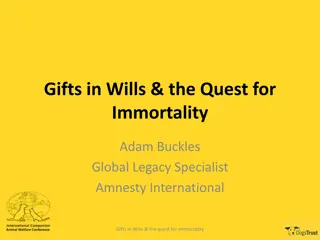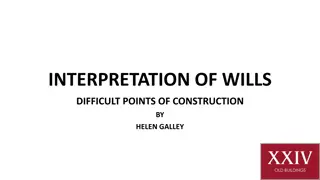
Legal Aspects of Successions in French and International Law 30.09.2024
Explore practical settlements, matrimonial property regimes, civil succession laws, tax implications, and estate planning in France and internationally. Learn about document requirements for estate arrangements, querying the last will, accepting the estate, and matrimonial property regimes.
Download Presentation

Please find below an Image/Link to download the presentation.
The content on the website is provided AS IS for your information and personal use only. It may not be sold, licensed, or shared on other websites without obtaining consent from the author. If you encounter any issues during the download, it is possible that the publisher has removed the file from their server.
You are allowed to download the files provided on this website for personal or commercial use, subject to the condition that they are used lawfully. All files are the property of their respective owners.
The content on the website is provided AS IS for your information and personal use only. It may not be sold, licensed, or shared on other websites without obtaining consent from the author.
E N D
Presentation Transcript
LEGAL ASPECTS FROM SUCCESSIONS French and international law 30.09.2024 1
S U M M A R Y 1.Practical settlement of an estate 2.Matrimonial property regimes in France and in international law 3.Civil succession in France and abroad 4.International and French tax succession 5.Estate planning 2
1- PRACTICAL ARRANGEMENTS FOR AN ESTATE Opening > Documents to be provided - original death certificate; - family record book ; - marriage contract of the deceased ; - last will and testament ; - heirs' contact details; - details of banking establishments in France and abroad ; - copy of property title deeds (deed of acquisition or inheritance) ; - other items (liabilities, invoices, health insurance, employer, etc.) declaratory system for heirs! 3
querying the LAST WILL DISPOSALS FILE : If RAS: intestate succession > legal devolution (default succession rules) If mentioned: testamentary succession (if the will is valid in form and substance). Focus on the different types of will : - Olograph + definition + conditions + effect - Authentic + definition + conditions + effect - Mystique + definition + conditions + effect 4
First step: drawing up the deed of notoriety to determine who the heirs are. The heirs must then opt to accept the estate: - Either pure and simple acceptance + definition + consequences; - Either waiver + definition + consequences ; - Either acceptance up to the amount of the net assets + definition + consequences. Before reaching this stage, the heirs will need to be fully aware of the contents of the estate. 5
2- MATRIMONIAL PROPERTY REGIMES IN FRANCE - the legal regime of community of property reduced to acquests: definition Example: couple married in community owns a house acquired after the marriage for 600 K. K. She has a bank account worth 5 K and a flat inherited from her parents worth 200 He has a bank account of 145 K. If my wife dies, what is the basis of inheritance? Answer: 300k (600/2) + 200k + 75k (150/2) = 575 K - Other conventional schemes. 6
THE MATRIMONIAL REGIME IN THE FRENCH DIP 1/ If a marriage contract has been drawn up => autonomy of will. 2/ Failing that : moved to France until today. => RM is the Italian legal regime (= community of acquests) 2.1/ Marriage before 1 September 1992 : Principle: 1st joint residence after union (min. 2 years > case law) Example: married in Greece, lived in Athens for 1 year, then moved to Italy for 5 years, then moved to France until today. => RM is the Greek legal system (= separation of property) 2.2/ Marriage between 1 September 1992 and 28 January 2019: Principle: 1st habitual residence after union (no minimum period) Example: married in Greece, lived in Athens for 1 year, then moved to Italy for 5 years, then 7
2.3/ Marriage after 28.01.2019 : 3 hierarchical criteria: 1/ first common habitual residence after marriage, 2/ common national law at the time of celebration of the marriage 3/ law of the closest links. ! Automatic mutability (> period 2.2) * Immediate if the couple settles in the country of common nationality Or * If settling in any country after a period of residence > 10 years Crystallize the law of your RM or change the law applicable to your RM 8
MATRIMONIAL PROPERTY REGIMES AROUND THE WORLD Legal regime in certain countries : Morocco, Libya, Iran (virtually all Arab and Maghreb countries): separation of property China: community of acquests England: separation of property Italy: community of acquests, USA: depends on the state (mostly property separation except in 10 states including Arizona, California, Texas, Washington, etc.). 9
3-INTERNATIONAL CIVIL SUCCESSION European Inheritance Regulation - 17.08.2015 EU except Denmark, Ireland, United Kingdom Principle: the deceased's last habitual residence will determine a single civil law applicable to the estate, wherever the real estate and personal property are located. "In order to determine the habitual residence, an overall assessment must be made of the circumstances of the deceased's life during the years preceding his death, in particular the duration and regularity of the deceased's presence in the State concerned, as well as the conditions and reasons for that presence: the habitual residence thus determined must reveal a close and stable link with the State in question. 10
Exception 1 (exception clause) : If in reality the deceased has closer links with another law (= another country). Exception 2: ("professio juris") : It is possible to fix the law applicable to one's succession by designating one's national law (= nationality) or one of its national laws (multiple nationality) in a will or a disposition mortis causa. - Universal application - referral. 11
CIVIL SUCCESSION IN FRANCE If there is no spouse entitled to inherit, the order of legal heirs is as follows: - 1: children and their descendants; - 2: father and mother; brothers and sisters and their children; - 3: ascendants other than father and mother; - 4: cousins and their descendants. Important information: - Only descendants are reserved heirs. - In a common-law relationship (even a civil partnership!): neither is the heir of the other! A will is required, but beware of tax implications... 12
The role of the surviving spouse (CS) : - The rights of the CS differ depending on whether he is competing with children from the union or children from a previous marriage. Example: married couple, 2 children from their union: death of one of the parents CS: full ownership (PP) or full usufruct (US) Children (as chosen by the CS): in PP (each 3/8 ) or full bare ownership (NP) the husband, who dies: Example: married couple, 3 children, one of whom is from a previous marriage of CS (= Madam): in PP. Children: in PP (3/12ths each) - (Total) deprivation of SC rights: conditions. 13
The possibilities for defeating the "default" determination : the will In the presence of child(ren) supervised freedom > reserved share of the child(ren) : 1/2 for an only child 1/3 if there are two children 1/4 if there are three or more children. 14
4- TAX SETTLEMENT OF AN INTERNATIONAL ESTATE Is there a tax treaty between France and the foreign country? If so, we will apply it. Disappearance of the Franco-Swiss Convention on Succession on 1 January 2015. If not, France is likely to tax an estate in 3 cases (art.750 Ter of the CGI): 1/ if the deceased was domiciled in France => all his assets (F + world) are subject to French taxation. 2/ if an asset (movable *or immovable) is located in France => deceased non-resident F, heir(s) non-resident(s) F. 3/ if an heir is domiciled in France (+ 6 / 10 years) => all assets received by him (F + world) are taxed. * Bank accounts, shares in SAPI (e.g. SCI) and partner's current account receivable. 15
FRENCH INHERITANCE TAX Direct line: Allowance (Ab.) of K100 (per parent and per child), then taxed at the tax rate (from 5% to 45%, see full rate below). Between spouses (or PACS partners): Exemption (with no ceiling!). Taxation between brother and sister: Ab. of 15,932 then 35% up to 24,430 and 45% above that. Taxation between uncles and nephews: Ab. of 7,967 then 55%. Taxation between non-parents : Ab. of 1,594 then 60%. 16
Time limit for settling inheritance tax : Death in France: 6 months Death abroad: 1 year Terms of payment : payment in full on the due date (otherwise penalties), payment in instalments: 1 year or 3 years (if more than 50% of assets are illiquid) + interest at the legal rate of 2.2% per annum + guarantee(s) in favour of the State. deferred payment: where an heir is granted usufruct, the bare owner may request deferred payment of his taxes on the death of the usufructuary, in return for statutory interest. Statute of limitations: 6 years (10 years for foreign bank accounts), 17
5- ESTATE PLANNING Protecting your spouse : Adjustment of the matrimonial property regime Allows you to protect your spouse by leaving him or her the use/ownership of all or certain assets. Limitation: action in retrenchment in the presence of a non-common child Gift between spouses / last living gift Allows the spouse to choose: - Usufruct of all assets (particularly if the family is blended). - in full ownership + in usufruct (= maximum share). 18
Protecting/favouring an heir (other than the spouse) : - Donation during your lifetime, outside your share of the estate; - Will: one child can be favoured over another. => Limit: the hereditary reserve (see above). Granting a beneficiary with life insurance : Contract taken out (= investment of funds) with designation of one or more beneficiaries. Excluded from civil succession (except in the case of fraud involving the reserved portion of an estate). Taxation : beneficiary (then 20% levy on taxable fraction 700,000; levy of 31.25% above that). * harder for payments made > the policyholder's 70th birthday (allowance of 30,500 for all beneficiaries; the surplus is reintegrated and taxed in the ordinary estate). * soft for payments made < the policyholder's 70th birthday (allowance of 152,500 per 19
Protecting family harmony : Simple donation Revaluation of the property at the time of inheritance: donation/death value statement Gift-Sharing Set values Hopes for an early split Attractive tax system Incorporation of previous donations Difficulty: allocating assets of equivalent value to all children 20
Reducing the tax burden: tax allowances for gifts - General allowance (reminder): EUR 100K (per parent and per child) every 15 years*. - Special allowance: 31,865 per parent and per child, every 15 years, but conditions : Cash only; Donor age < 80; Donor age > 18. - Grandchild(ren) allowance: 31,865 (per GP and per PE) every 15 years*. - Allowance great grand-children: EUR 5,310 (per AGP and APE) every 15 years*. *no age requirement 21
Dismemberment of ownership: donation with usufruct reserved Definition: Irrevocable transfer of ownership of a property while retaining enjoyment (living/renting) for life or for a defined period. Interest No joint ownership, the bare owner(s) cannot demand a division. On the death of the usufructuary, full ownership of the property reverts to the bare owner, with no deeds, taxes or costs. The taxes can be paid by the donor without this constituting an additional donation. Definitive freezing of the value of the property on the date of the gift. Conditions Consent obtained by notarial deed. Tailor-made clauses (successive usufruct, prohibition on the heir joining the community, right of return in the event of the heir's premature death, charges for major works, etc.) Limits Loss of freedom to dispose of (= sale) and mortgage: imperative agreement of bare owner(s). Immediate payment of taxes (without the option of deferring or splitting) 23
Donation with usufruct reserve > numerical example : Married couple with two children Owner (50/50) of a chalet in MEGEVE (France) Value of EUR 1.2 million He is 75 years old She is 68 years old. Comparison between : (i) "unprepared succession" and (ii) "donation with reservation of usufruct". 25
(i) Unprepared inheritance (death of both parents) Father's estate: EUR 600,000 reverting to his 2 children (EUR 300,000). 100K allowance, 200K taxable > 20% rate*: EUR 40K per child, i.e. 80K in total Mother's estate: idem: 80 K => Total taxes: 160 K + inheritance tax (approx. 2%) *excluding the previous brackets (from 5 to 15%). 26
(ii) Gift with reservation of usufruct : Donation by father : 600 K - value of his US (30%) = 420 K reverting to each child: 210 K 100K allowance, 110K taxable > 20% rate*: EUR 22K per child, i.e. 44K in total Donation by mother : 600 K - value of his US (40%) = 360 K reverting to each child: 180 K Allowance of 100 K: 80 K taxable remainder > 20% rate*: EUR 16 K per child, i.e. 32 K in total => Total taxes: 76 K + deed of gift costs (approx. 2%) *excluding the previous brackets (from 5 to 15%). 27
Comparison : (i) Estate........................160 K (ii) Gift with usufruct reserved ........................ 76 K Tax gain................................. 84 K Conclusion: act rather than suffer... 28
M E R C I D E Y O U R A T T E N T I O N ! Ma tre Emmanuelle BARRALIER Associate notary (FR/ENG) - Civil law notary e.barralier@1594notaires.fr Specialised in international law Ma tre Mathieu BARRALIER Notaire associ (FR/ENG) - Civil law notary m.barralier@1594notaires.fr Specialised in international law 29



